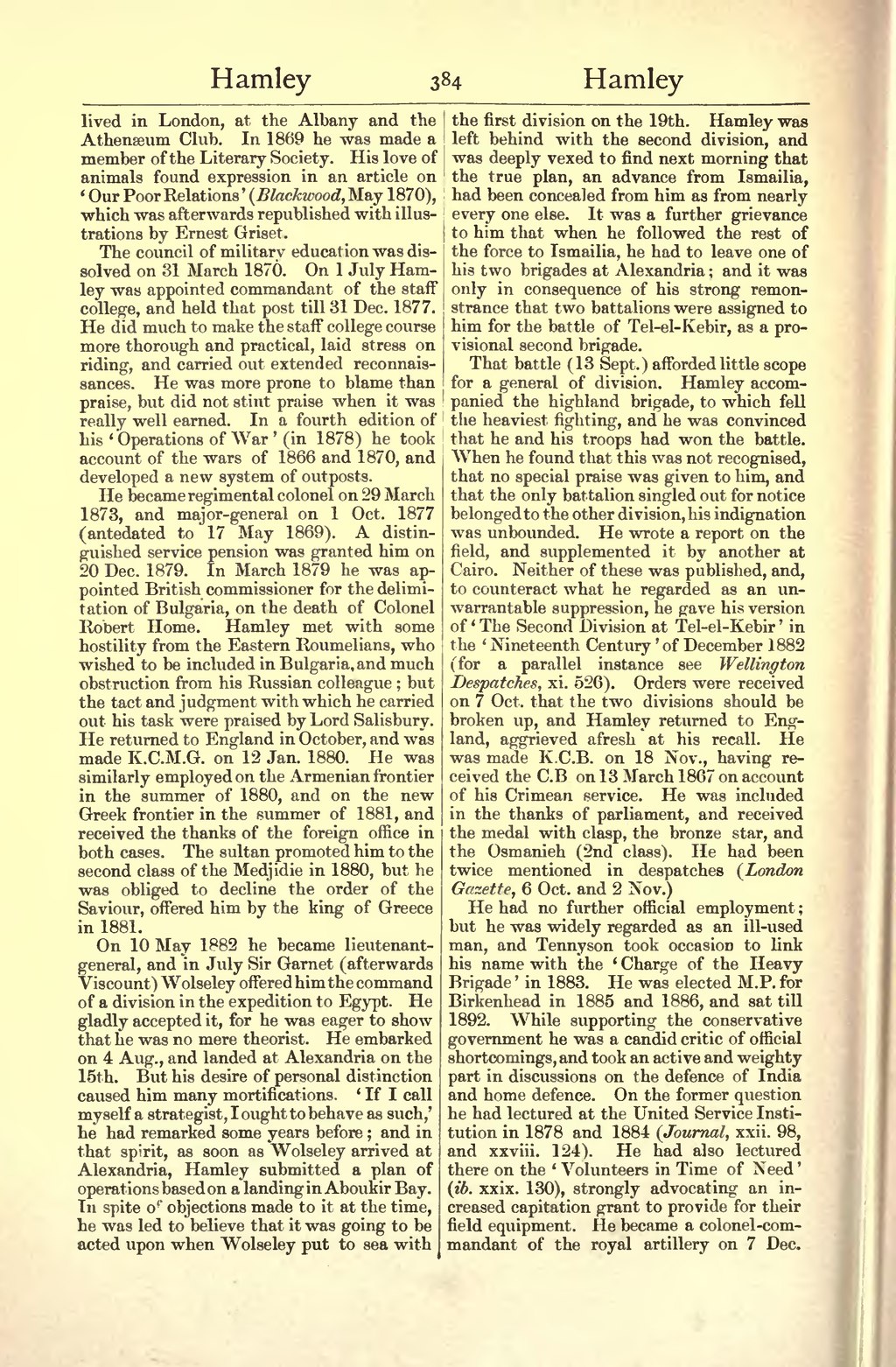lived in London, at the Albany and the Athenæum Club. In 1869 he was made a member of the Literary Society. His love of animals found expression in an article on 'Our Poor Relations' (Blackwood, May 1870), which was afterwards republished with illustrations by Ernest Griset.
The council of military education was dissolved on 31 March 1870. On 1 July Hamley was appointed commandant of the staff college, and held that post till 31 Dec. 1877. He did much to make the staff college course more thorough and practical, laid stress on riding, and carried out extended reconnaissances. He was more prone to blame than praise, but did not stint praise when it was really well earned. In a fourth edition of his 'Operations of War' (in 1878) he took account of the wars of 1866 and 1870, and developed a new system of outposts.
He became regimental colonel on 29 March 1873, and major-general on 1 Oct. 1877 (antedated to 17 May 1869). A distinguished service pension was granted him on 20 Dec. 1879. In March 1879 he was appointed British commissioner for the delimitation of Bulgaria, on the death of Colonel Robert Home. Hamley met with some hostility from the Eastern Roumelians, who wished to be included in Bulgaria, and much obstruction from his Russian colleague; but the tact and judgment with which he carried out his task were praised by Lord Salisbury. He returned to England in October, and was made K.C.M.G. on 12 Jan. 1880. He was similarly employed on the Armenian frontier in the summer of 1880, and on the new Greek frontier in the summer of 1881, and received the thanks of the foreign office in both cases. The sultan promoted him to the second class of the Medjidie in 1880, but he was obliged to decline the order of the Saviour, offered him by the king of Greece in 1881.
On 10 May 1882 he became lieutenant-general, and in July Sir Garnet (afterwards Viscount) Wolseley offered him the command of a division in the expedition to Egypt. He gladly accepted it, for he was eager to show that he was no mere theorist. He embarked on 4 Aug., and landed at Alexandria on the 15th. But his desire of personal distinction caused him many mortifications. 'If I call myself a strategist, I ought to behave as such,' he had remarked some years before; and in that spirit, as soon as Wolseley arrived at Alexandria, Hamley submitted a plan of operations based on a landing in Aboukir Bay. In spite of objections made to it at the time, he was led to believe that it was going to be acted upon when Wolseley put to sea with the first division on the 19th. Hamley was left behind with the second division, and was deeply vexed to find next morning that the true plan, an advance from Ismailia, had been concealed from him as from nearly every one else. It was a further grievance to him that when he followed the rest of the force to Ismailia, he had to leave one of his two brigades at Alexandria; and it was only in consequence of his strong remonstrance that two battalions were assigned to him for the battle of Tel-el-Kebir, as a provisional second brigade.
That battle (13 Sept.) afforded little scope for a general of division. Hamley accompanied the highland brigade, to which fell the heaviest fighting, and he was convinced that he and his troops had won the battle. When he found that this was not recognised, that no special praise was given to him, and that the only battalion singled out for notice belonged to the other division, his indignation was unbounded. He wrote a report on the field, and supplemented it by another at Cairo. Neither of these was published, and, to counteract what he regarded as an unwarrantable suppression, he gave his version of 'The Second Division at Tel-el-Kebir' in the 'Nineteenth Century' of December 1882 (for a parallel instance see Wellington Despatches, xi. 526). Orders were received on 7 Oct. that the two divisions should be broken up, and Hamley returned to England, aggrieved afresh at his recall. He was made K.C.B. on 18 Nov., having received the C.B on 13 March 1867 on account of his Crimean service. He was included in the thanks of parliament, and received the medal with clasp, the bronze star, and the Osmanieh (2nd class). He had been twice mentioned in despatches (London Gazette, 6 Oct. and 2 Nov.)
He had no further official employment; but he was widely regarded as an ill-used man, and Tennyson took occasion to link his name with the 'Charge of the Heavy Brigade' in 1883. He was elected M.P. for Birkenhead in 1885 and 1886, and sat till 1892. While supporting the conservative government he was a candid critic of official shortcomings, and took an active and weighty part in discussions on the defence of India and home defence. On the former question he had lectured at the United Service Institution in 1878 and 1884 (Journal, xxii. 98, and xxviii. 124). He had also lectured there on the 'Volunteers in Time of Need' (ib. xxix. 130), strongly advocating an increased capitation grant to provide for their field equipment. He became a colonel-commandant of the royal artillery on 7 Dec.
